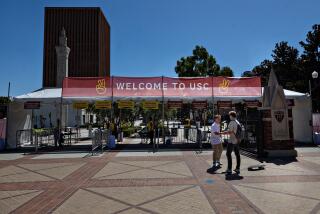California legislators OK two Internet-related measures
SACRAMENTO — State lawmakers sent two Web-related proposals to the governor Tuesday, one that would bar landlords from requiring that rent be paid online and another intended to protect the privacy of college students using Twitter, Facebook and other social media.
The legislators said they were concerned that many low-income and elderly tenants do not have easy access to the Internet and some background checks on students go too far.
The rent bill is by Sen. Ted Lieu (D-Torrance), who heard complaints after the manager of a 300-unit apartment complex in Los Angeles notified tenants they would have to pay online.
“A growing number of landlords are no longer accepting checks or money orders from tenants,” Lieu said in a statement. “Many residents of the rent-controlled complexes are elderly, live on fixed incomes and have no computer.”
The measure, which had already passed the Assembly, was supported by tenant groups and by the California Apartment Assn., which represents landlords.
Association spokesman Eric Wiegers said his group supported SB 1055 because it would not prohibit a landlord and tenant from mutually agreeing that rent payments will be made electronically.
Many tenants may prefer that form of payment, he said, but his organization “recognizes that not all renters have the ability or means to pay rent exclusively through electronic fund transfers.”
The Senate also gave final approval to a measure that would prevent colleges and universities from formally asking students to provide their social media user names and passwords.
Sen. Leland Yee (D-San Francisco) said he was alarmed by reports of employers and college officials asking for such account information to monitor students’ online activity.
Some University of California coaches have asked student athletes to “friend” them on Facebook so the coaches could assess their online activity, said Steve Montiel, a spokesman for the university system.
That would be prohibited under Yee’s bill. The lawmaker said students often post personal information, including their religion and sexual orientation, on social networking sites, and the information should not be required by coaches or other college officials.
“California is set to end this unacceptable invasion of personal privacy,” said Yee, author of the bill, SB 1349.
The Senate also passed a measure that would restrict the ability of local law enforcement officers to hold people for possible deportation at the request of federal immigration officials, unless the individual has been convicted of a serious or violent felony or county prosecutors have charged the person with such a violation.
But the measure must go back to the Assembly, where it originated, for final approval of changes before it can go to the governor for his signature or veto.
Assemblyman Tom Ammiano (D-San Francisco) is the author of the measure, AB 1081, also known as the Trust Act.
“With this bill, the California Legislature stands against the immigration abuses that have ended the dreams of thousands of aspiring citizens of California,” Ammiano said in a statement after the vote.
Opponents, including the California State Sheriffs’ Assn., said it would muddy the water on the powers of local law enforcement, leaving sheriffs “in a tremendous position of liability,” the association wrote in a letter to lawmakers.
Another measure passed by the Senate and awaiting final approval from the Assembly is a proposed two-year extension of tax credits for the film and television industry. The bill’s backers said it would provide $100 million annually through July 2017.
“The film and television industry is critically important to the economic vitality of the Los Angeles area,” said Sen. Fran Pavley (D-Agoura Hills), who spoke in its favor.
The tax credit, which will otherwise expire in 2015, was intended to stop films and television shows from being shot in other states to cut costs.
Sen. Sam Blakeslee (R-San Luis Obispo) was among opponents of the bill from both parties. He said California needs a “major overhaul of our tax system” that affects all industries, rather than credits for “a few favored industries that are politically connected.”
Sen. Ron Calderon (D-Montebello) is the author of the proposal, SB 1167.
Times staff writer Michael J. Mishak contributed to this report.
More to Read
Sign up for Essential California
The most important California stories and recommendations in your inbox every morning.
You may occasionally receive promotional content from the Los Angeles Times.











